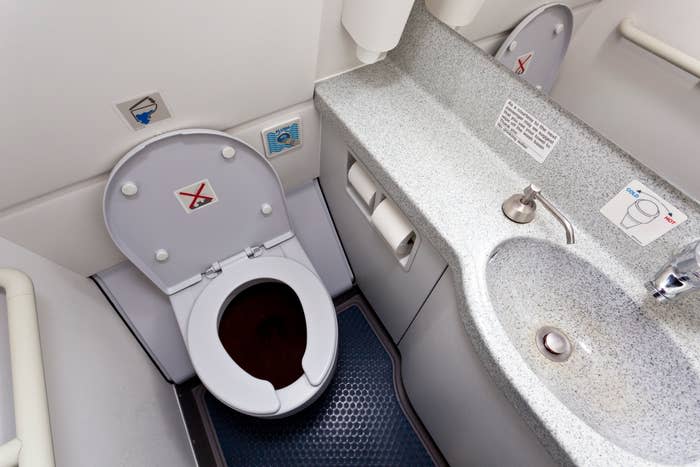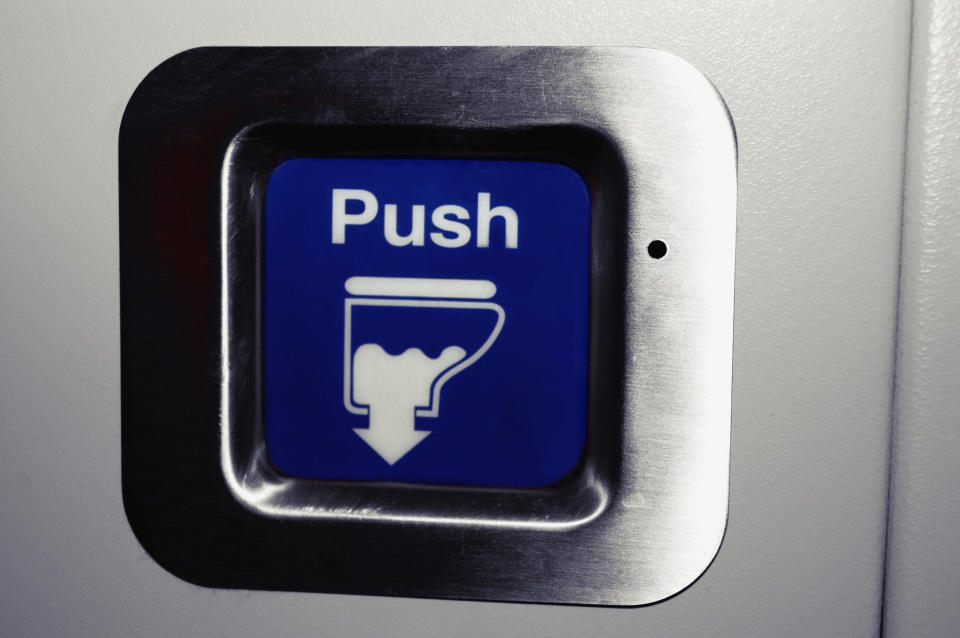Poop Emergencies Can Ruin Entire Flights. Here's What Everyone Should Know.

Most people tend to avoid using the bathroom on an airplane when possible, but this can be difficult during a long-haul flight.
A transatlantic Delta Air Lines flight made headlines after it was forced to turn around due to a “biohazard issue.” The problem? A passenger’s severe case of diarrhea, which left a messy trail down an aisle.
Situations like what occurred on this Delta flight are extreme, and medical emergencies can be difficult to handle at 30,000 feet. But the incident has nonetheless sparked conversations around the experience of in-flight pooping.
Although most people tend to avoid using the bathroom on an airplane when possible, this can be difficult during a long-haul flight. Sometimes nature calls.
So, what should you keep in mind regarding hygiene, health, and respect for fellow passengers? We asked medical experts and frequent flyers for their advice.
First of all, fecal matter is indeed a "biohazard."
“Both urine and feces are categorized as biohazards due to presence of infectious disease agents and toxins,” said Jagdish Khubchandani, a professor of public health at New Mexico State University. “Our intestines and urinary tract contain bacteria, and if a person has infectious disease, they may also have virus in their intestines. These are excreted during normal times and when a person is infected.”
Coming into contact with human waste can cause bacterial, viral, or parasitic infections, which can range from a mild case of food poisoning to very serious illness. These typically spread through what is called the fecal-oral route. So, for example, you might touch a surface that contains another person’s fecal matter because they didn’t wash their hands, and then later you touch your mouth or your food.
“Feces contains a lot of organisms that are invisible to the naked eye, and some of these organisms can make you very sick if ingested, even in small quantities,” said Dr. Rabia de Latour, a gastroenterologist and assistant professor of medicine at New York University’s Grossman School of Medicine. “You can get a gastroenteritis if ingested inadvertently because someone who had it didn’t wash their hands properly and spread it to you through direct contact, foodborne, or through surfaces.”
Similarly, the bacteria or viruses that cause conjunctivitis can be found in fecal matter, so you could get pink eye if you touch your eye after coming into contact with those germs.
“If a person is having an acute episode of diarrhea or has a diarrheal illness ― which seems like it might have been going on in the case of that flight ― the bacteria and viruses that cause it can spread easily and lead to things like norovirus outbreaks,” said Dr. Aaron Martin, a gastroenterologist at Jefferson Health in Philadelphia. “Now, it’s not going to just spread through the air and infect people on a plane like that, but it can spread through contact with people walking and the food and drink cart going up and down the aisle.”
He emphasized that the staff on an airplane likely doesn’t have all of the proper equipment to adequately clean up the amount of waste seen in footage from the Delta flight ― and to protect themselves and the passengers as they clean.
“Some infectious disease agents in the feces of infected individuals are very difficult to deactivate and remove with traditionally available disinfectants in flights and homes,” Khubchandani added. “While some would argue that the risks on flights are lower than in public places on the ground, we must remember that millions of people fly every day, share toilets, and hundreds of thousands of meals are served daily on board. Also, it is easier to deal with emergency situations on ground than in airplanes.”

Take note of the surfaces in airplane bathrooms that have been touched by many people.
That’s why hand hygiene is everything.
“If you need to use the bathroom to poop, you have to poop,” de Latour said. “Aside from ensuring that one keeps the bathroom clean post-use for the next user, the single most important thing is to adequately wash your hands afterward to ensure there is no fecal matter spread on the plane via handles, faucets, arm rests, seat belts, etc.”
When you get up to use the bathroom on an airplane, go with an extra sense of vigilance and caution around hygiene.
“In addition to washing your hands, be mindful that you’re then going to be touching things to turn off the water and open the door, and these are all areas where bacteria and viruses can live,” Martin said. “Other people might not have been as hygienic, so any time I use a public restroom and wash my hands, I will hold a paper towel or toilet paper as I turn off the water and open the door because my hands are now clean and I don’t want to touch what other people have been touching.”
You can also bring your own bottle of hand sanitizer to clean off additional germs you might have come into contact with after washing your hands in the sink.
“Consider carrying your own antibacterial wet wipes so that you can wipe down surfaces, and use them for your hands afterward,” suggested Meg Jerrard, cofounder of Solo Female Travelers. “Make sure you’re wearing shoes into the bathroom, even if you’ve kicked them off during the flight.”
Airplane bathroom sinks aren’t always the best for hand washing, given the tight quarters and often limited amount of water (plus the need to frequently press a button or turn a faucet to keep the water flowing). Try to make do as best you can, and avoid lavatories that seem highly unsanitary.
“The best idea is to avoid going to restrooms, but if one has to go, practice the level of hygiene you do at home or the highest level you can,” Khubchandani said. “Do not use restrooms that are dirty, excessively smelly, have spills, or clearly need maintenance. Call the flight attendants and bring these problems to their notice.”
Respect your fellow passengers.
Try to be discreet with your bathroom habits out of courtesy for your fellow passengers.
“Make sure the toilet is clean after you are finished,” advised Phil Dengler, cofounder of The Vacationer. “Flush multiple times if necessary, and make sure no streaks are left behind. I recommend bringing a Poo-Pourri toilet spray to eliminate bad odors. Ultimately, the airplane bathroom should have no trace or scent of you ever being there.”
He also places toilet paper on the seat cover and sits instead of squatting to avoid a potential disaster should the plane experience turbulence at that time.
“Avoid foods before and during your flight that can cause gas ― high-fiber foods like whole wheat, bran, prunes, peaches, apples, pears, asparagus, artichokes, cauliflower, cabbage, etc.,” Jerrard said. “If the bathroom is out of toilet paper, or wipes, or it’s disgusting inside, it’s worthwhile warning the passenger who is waiting to enter directly after you leave. Then you’re not leaving them to find out with their pants around their feet!”
She also stressed the importance of using bathrooms as bathrooms and nothing else.
“Joining the mile high club is seriously overrated and incredibly unhygienic,” Jerrard said. “Likewise, use the bathroom trash for bathroom trash only. Don’t throw out your extras, which don’t belong there and clog up the trash chutes for everyone else.”
If you develop digestive issues on a plane, take care of yourself.
Sometimes, unexpected things occur during a flight, but if you develop digestive issues in the air, don’t panic.
“The important thing to do is to remain hydrated, as diarrhea can dehydrate you,” de Latour said. “If hungry, eat simple, plain foods like bread or crackers, if available.”
If you’ve been drinking alcohol, stop immediately and focus on water. Avoid spicy foods that can provoke the gut.
“If your GI [gastrointestinal] issues are severe enough, alert a flight attendant, as embarrassing as it may be,” Dengler said. “Some planes only have a few bathrooms, so making them aware of your issues may be helpful since you will be in and out often.”
You can also ask the flight crew for frequent glasses or bottles of water to prevent dehydration. They might be able to provide foods that are helpful in these instances as well ― like the BRAT (bananas, rice, applesauce, toast) diet.
“The crew might even be able to move you to an aisle seat or one that’s closer to a bathroom,” Martin said. “Acute diarrheal illnesses are often from a viral or bacterial infection and typically run their course within 48 to 72 hours, so we typically don’t recommend taking anti-diarrheal medications to slow things down. You want to let that run its course.”
Otherwise, continue to prioritize hand-washing.
“Practice aggressive hygiene in and out of the restrooms ― using wipes, sanitizing toilet seats and sinks, washing hands,” Khubchandani said. “An infected person with GI issues needs to be careful with these risk factors, as one can infect many others and cause a terrible situation involving other passengers and the flight overall.”
There are helpful steps you can take before a flight.
Preparation makes a big difference when it comes to digestive issues. Pack hand sanitizer and wet wipes, and don’t get adventurous with your eating before a flight.
“I recommend taking preventative measures,” Dengler said. “Avoid ‘dangerous’ foods a few days before and on the day of the flight. Limit your alcohol intake before and during the flight. Additionally, it does not hurt to bring [over-the-counter] medicine such as Pepto Bismol and Imodium. Do not forget any prescription GI medicine you have been prescribed. If your GI issues start the day before or the day of your flight, consider asking your airline to change your flight.”
Jerrard similarly recommended steering clear of foods that cause upset stomach or bloating. Instead, opt for safe and bland.
“Avoid foods like onion, kale, beans, red meat, lentils, and wheat, which naturally make your stomach expand, and instead of carbonated drinks like Coke, go with water,” she said.
“And go to the bathroom before you fly,” Jerrard added. “If you have lounge access before boarding, this will be more hygienic than the general public airport bathrooms, as their cleaning schedules are more often and detailed.”
This story originally appeared on HuffPost.


